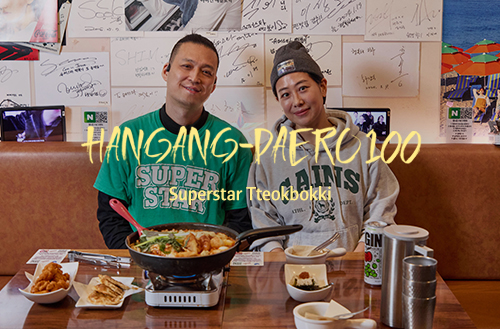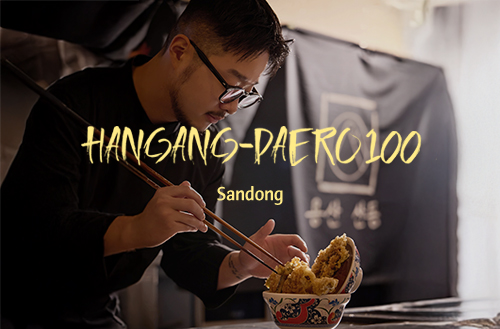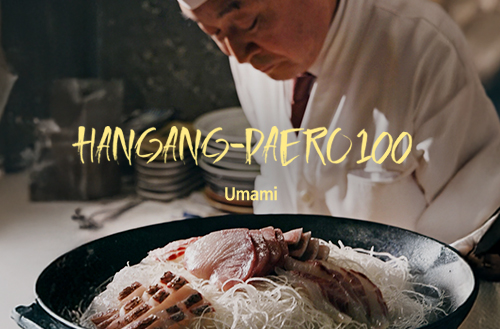
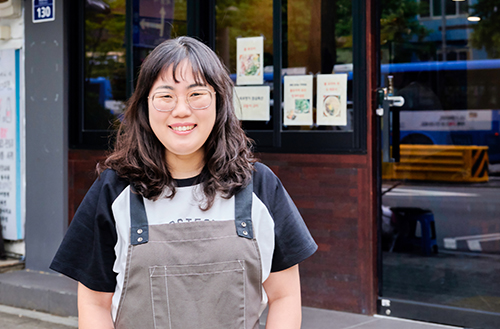
-
-
- 메일 공유
-
https://stories.amorepacific.com/en/amorepacific-meeting-kwak-seung-mi-the-head-of-mokpo-myeongga
Meeting Kwak Seung-mi, the Head of Mokpo Myeongga
The Place in Yongsan Where the Seasons Arrive First

The wind has grown considerably warmer. There's a place in Shinyongsan where you can first feel the change of seasons. Celebrating its 8th anniversary this year is the seasonal food restaurant Mokpo Myeongga. Amore Stories had the opportunity to meet Kwak Seung-mi, the head of the bustling Mokpo Myeongga, as they prepared for the summer season.
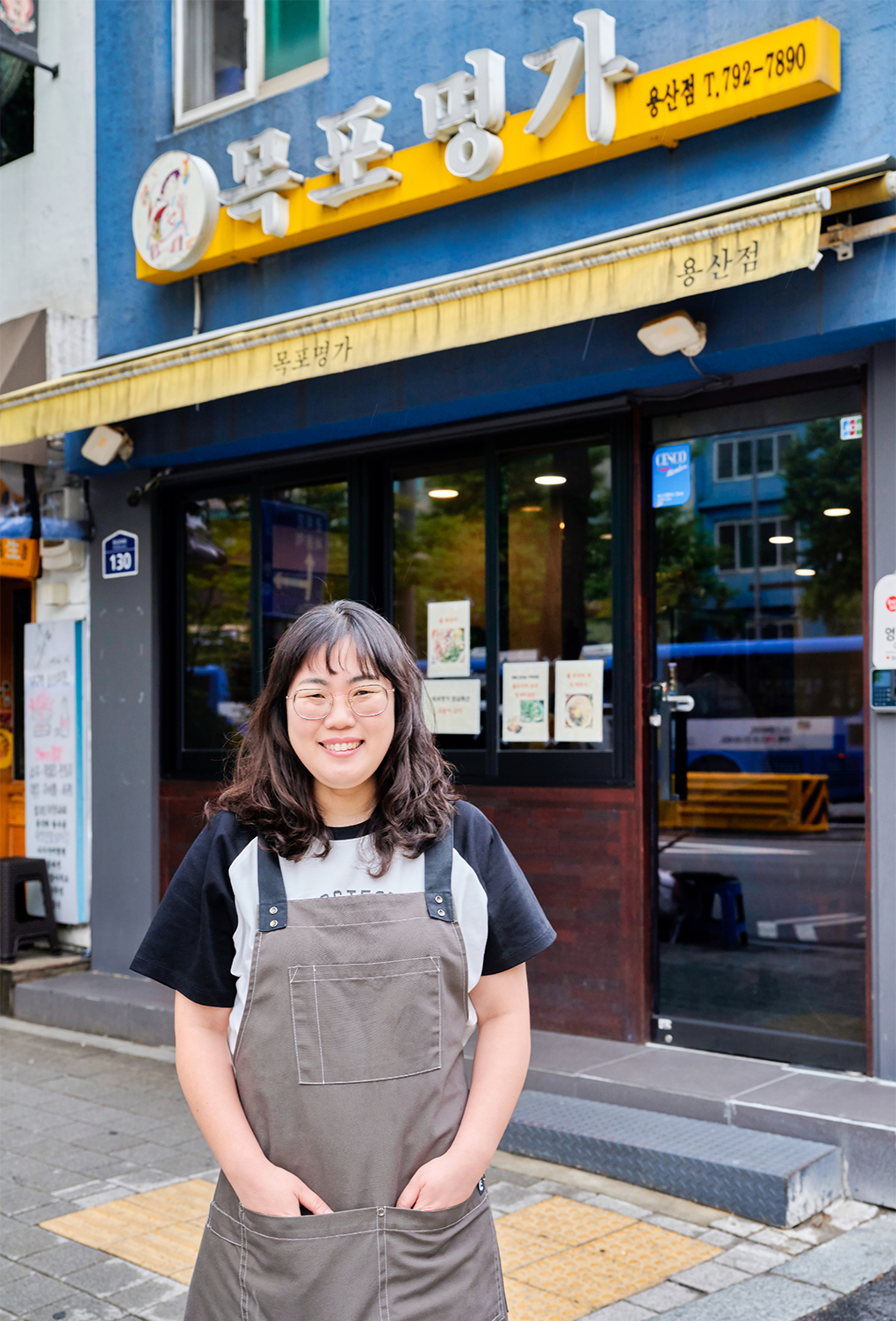
Kwak Seung-mi, Head of Mokpo Myeongga, in Front of the Yongsan Branch
A Word That Moved a Career-Interrupted Woman: "Can You Do It?"
What were you doing before opening Mokpo Myeongga?
I was an ordinary office worker. I handled tax accounting at a small trading company. I worked there for almost ten years, but after getting married and becoming pregnant, there was no one to replace me during my maternity leave. Although the company had a maternity leave policy, it wasn't feasible to use it freely due to the company's circumstances. Regrettably, I decided to resign. Two years after having my first child, I had my second. When my second child was ready for daycare, I needed to return to work. Raising two children on a single income was challenging, and as someone who had always worked, I found staying home with the kids somewhat stifling.
Did you consider re-entering the workforce?
Re-entering the workforce took more work than I expected. For a couple of months, I went to numerous interviews. The most frequent question I heard was, "Can you do it?" It implied whether I could manage to work with young children after a long break. Although I assured them I could cope with the help of daycare and my mother, most companies have yet to contact me back. The few that did offer absurdly low salaries. Despite having ten years of experience, they provided me with entry-level wages because I had taken a break. It might sound arrogant, but it hurt my pride. I refused such offers, which left me with no place to work. I then realized the harsh reality of how society views career-interrupted women. I never thought this would apply to me. I assumed I could easily find a job in my field, but I was wrong. When it happened to me, it felt despairing.
How did you start your business?
I spent about three months in despair until an acquaintance told me about a great place available in Yongsan. They knew I was looking for work and informed me. Due to some complex circumstances, the place was much cheaper than the market rate. Initially, I thought, "How could I run a business?" But I went to see the place out of curiosity. At the time, Amorepacific's new headquarters was almost complete and undergoing interior construction. Seeing the massive, impressive building from afar was overwhelming. I heard that nearly ten thousand people would work there. Although I had no prior ties to Shinyongsan, and the area only had on-site restaurants known as 'Hambajib,' I decided to go into business mainly because of Amorepacific. I probably wouldn’t have gone ahead if I hadn't seen that building. The timing and luck were on my side.
Why did you decide to open Mokpo Myeongga?
Initially, I considered opening a franchise café. With no prior business experience, a franchise café seemed like a relatively easy option. My aunt operated Mokpo Myeongga in Gangnam, and there were no branch locations at that time. Given her extensive experience, I sought her advice. She mentioned that while franchises can be convenient, they don't yield high profits, and suggested I consider opening a branch of Mokpo Myeongga instead. Back then, I had no cooking skills whatsoever; I developed them over time through learning and practice. Initially, the idea of running a restaurant seemed absurd to me. However, my aunt offered to assist with everything—from recipes and kitchen equipment to suppliers and hiring staff. She stayed about a month after the opening to help manage the operations.
Did your family or friends oppose the idea?
My husband was very supportive. He saw how hard I was trying to re-enter the workforce and encouraged me to give it a shot. When I expressed my concerns about failure, he said, “Think of it as risking our house. I won’t blame you.” His words gave me unexpected strength. I thought, “Since he said that, I’ll really do it!” (laughs). Deep down, I believed the chances of failure were higher since it was my first time. Fortunately, we’re still holding on well.
Did you regret the thought of losing your career?
I could still utilize my skills even while running a business. Accounting is essential, no matter how small the store. Whether you hire a tax accountant or not, knowing accounting yourself makes a big difference. Realizing that my experience could be helpful in this new way made me feel proud and amazed.
How was the response after opening?
We opened in June's peak heat, and our mulhoe (cold raw fish soup) flew off the shelves from day one. Many of our customers were construction workers who found it the perfect meal after working in the heat. The timing was perfect, and we seemed fortunate from the start.
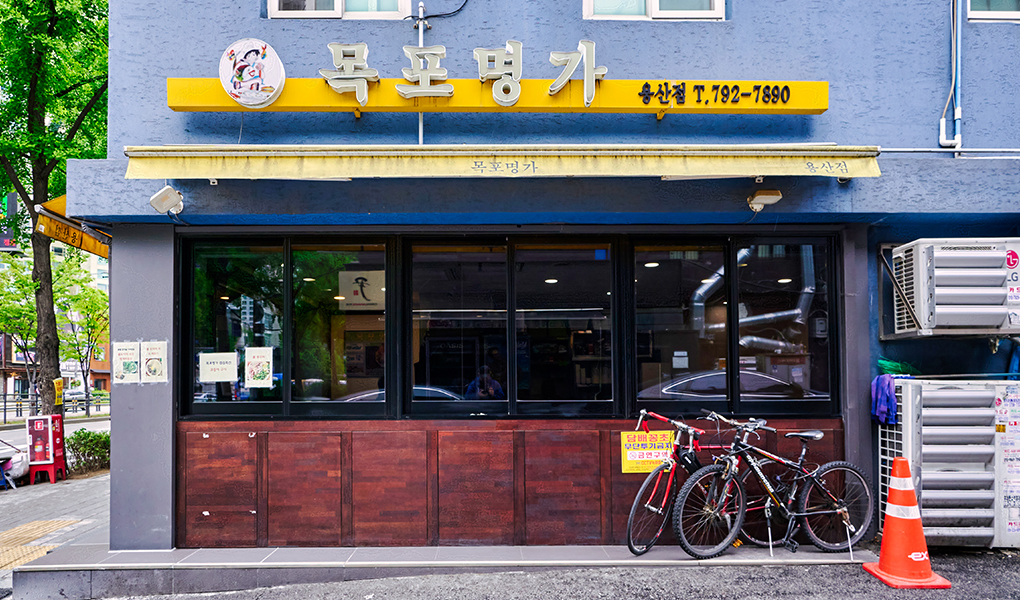
View of Mokpo Myeongga's Yongsan Branch
The Taste of the Seasons: Where You Can Meet the Seasons First
How does Mokpo Myeongga differ from the main branch?
While we brought the essential recipes from the main branch, the menu composition and recipes varied slightly, resulting in slightly different flavors. The main branch adheres strictly to traditional Jeolla province cuisine, while the Yongsan branch offers a cleaner taste. The younger crowd in this area tends to find intense flavors overwhelming. Each branch differentiates itself naturally due to differences in restaurant size and target demographics.
What is the most popular dish at Mokpo Myeongga?
Mokpo Myeongga is a seasonal restaurant with menus that change with the seasons. In spring, we serve flounder; in summer, croaker soup, mulhoe, and cuttlefish; in autumn, gizzard shad; and in winter, yellowtail. While it's hard to pick a favorite, the yellowtail stands out. It pairs exceptionally well with our homemade aged kimchi and seaweed from Wando. Perfected through numerous trials, the aged kimchi adds a spicy and tangy flavor that complements the yellowtail. We recommend the croaker soup, mulhoe, and parboiled cuttlefish in May.
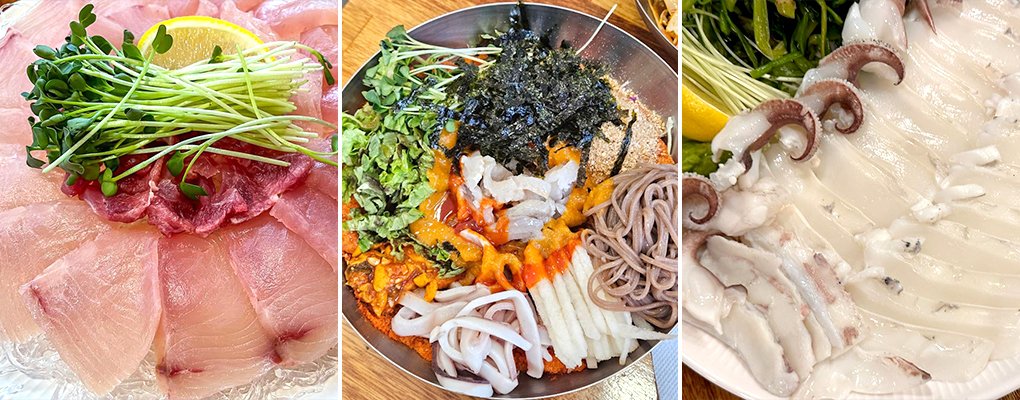
Winter's Signature Dish: Yellowtail, and May's Signature Dishes: Mulhoe and Parboiled Cuttlefish
What is the charm of a seasonal restaurant?
It's the ability to fully savor the seasons and experience something new with each one. Serving the same menu all year can become monotonous. When the seasons change, customers come with the anticipation of finding new dishes. Thus, our clientele varies slightly with each season. In autumn, those who love gizzard shad visit, and in winter, fans of yellowtail arrive. We look forward to the return of these seasonal patrons. The most significant appeal of Mokpo Myeongga is offering fresh, seasonal ingredients that capture the essence of each season.
How do you develop new recipes?
I make it a point to watch 'mukbang' (eating broadcast) videos regularly. If I see a dish that seems a good fit for our restaurant and would appeal to our customers, I look up the recipe. Then, I adjust the proportions to suit our customers' tastes. Initially, I was adamant about only serving Mokpo Myeongga's unique dishes. However, trends are constantly changing, and with Shinyongsan's growing popularity, more young customers are coming in. While we stick to our roots, we continuously develop new dishes.
Hardships Come in Waves
What was the most challenging period for you?
Without a doubt, it was during the COVID-19 pandemic. Even during the end-of-year season, when sales are typically at their highest, gatherings of more than two people were prohibited, and we had to close early. As they say, hardships come in waves, and as business slowed down, more problems followed. Conflicts with employees arose, and the stress made me physically ill. Honestly, I often thought about quitting. At one point, I impulsively put the store up for sale but quickly retracted the decision, realizing it wasn’t right. I felt too guilty towards our loyal customers to give up. We had no choice but to survive on our savings. I kept telling myself it would be over in a year, then in two, but it dragged on for three years. Every payday and bill due date brought immense stress. After nearly three years of this, I reached burnout.
I remain deeply grateful to the Amorepacific employees who came for evening meals, even if they couldn't enjoy raw fish. Their patronage allowed me to manage the payroll of my staff barely. To this day, we still serve evening meals. Raw fish restaurants don’t offer meal menus in the evening because it’s more profitable to sell raw fish. Although serving only raw fish would be more lucrative, I was so moved by their support that, except for the year-end, we continue to serve meals in the evenings.
How did you overcome these difficult times?
Back then, I was overwhelmed with lethargy. I was listless at the store, neglected household chores, and constantly snapped at my family. In hindsight, I wonder if I was depressed. My husband was my most significant support during this period. Despite my daily complaints, he calmly said, “Yes, it’s tough for you. It’s natural to feel this way.” Even though his words weren't grand, they were incredibly comforting. I started thinking, “Yes, it’s natural to feel this way,” and tried to shift my mindset positively, avoiding self-blame. As my husband said, it wasn’t my fault, and I could do nothing to change the situation. I spent much time with my children during this period. Typically, my husband is the type to find solutions immediately when I complain, but when I am genuinely struggling, he listens and comforts me. Thanks to my family, I managed to endure those tough times.
How did you resolve conflicts with your staff?
Managing staff is the hardest part of running a business. Most of our employees are seasoned professionals with strong convictions about their work methods. Many stuck to their methods even when I explained our way of doing things. Convincing and adjusting to them was highly challenging. Some even quit mid-way. To reduce conflicts, I changed my communication style. Instead of giving direct orders like “Do this” or “Do that,” I started saying, “I think it might be better to do it this way. What do you think?” This softer approach gradually helped. Sometimes, I’d even add a bit of charm, asking for help in a playful manner. Letting go of the “I’m the boss” mindset was crucial. After many trials and errors, I’ve reached a point where my staff and I are in perfect sync.
When do you feel glad you decided to run a business despite the many challenges?
There was a deeply touching moment. As the pandemic was subsiding, a regular customer who had stayed away due to COVID-19 came in and expressed gratitude. They said they loved our food and were thankful we didn’t close down and continued serving. Many businesses closed during the pandemic, and hearing their heartfelt appreciation moved me to tears. It felt like someone recognized all the hardships we endured. At that moment, I thought, “I’m glad I persevered. I’m glad I decided to run this business.”
How a Working Mom Finds ‘Work-Life Balance’
Running a business and raising two children can’t be easy.
What does your day look like from morning to evening?
Both of my children are in elementary school. I wake up at 6:30 AM, prepare breakfast for the kids, and send them to school. After caring for some housework, I head to the restaurant around 10 AM. I prepare the ingredients and have breakfast at the restaurant, as I need to taste the food myself to ensure the quality. After the lunch rush, around 1 PM, I return home, do more housework, pick up the kids from school, and send them to after-school programs. By then, it’s 6 PM, and I head back to the restaurant for the dinner service. We close around 9:30 PM, and I get home after 10 PM.
It sounds like a whirlwind of activity.
Was it tough when the children were younger when you opened the restaurant?
I relied heavily on daycare and my mother’s help. Daycare centers are fantastic these days and can care for children until 7 or 8 PM. Thanks to my mother, I could bring the kids home earlier. In the early days, when the restaurant was still establishing itself, there was no break time in the afternoon, and I didn’t leave until after 11 PM, so I only saw the kids when they were asleep. The hardest part was not being able to spend time with them. It broke my heart when they would say, “Our mom only comes home at night, so we don’t see her much.”
How do you maintain a work-life balance?
Since weekdays end late, I dedicate weekends to my family. We also take off for holidays whenever possible. During peak holiday seasons, staying open is tempting because business is good, but I choose to spend that time with my family. On weekdays, I only see the kids briefly when dropping them off at school, so I prioritize weekends and holidays to be with them. Self-employed individuals need to find their ways to balance work and life.
Maintaining a Harmonious Relationship by Keeping a Distance
What has been the driving force that keeps you going for so long?
Initially, I started this business to cover my kids’ tuition, but over time, it felt like I was building something of ‘my own.’ There are many things in this line of work that you can only learn through experience, like having ‘an eye for quality ingredients.’ My desire to excel grew stronger as I developed a sense of pride in what I was doing. Pride in ‘my work’ has become a key motivator.
Do you ever feel like you don’t want to work?
Honestly, I’ve never felt that way. It felt somewhat stifling even when I was solely focused on raising my kids. While there was immense joy in being with my children, making them my entire world made me feel like I was losing myself. Sometimes, work feels like a lifeline. When I’m busy working and raising kids, there’s no time to feel stressed. The days are so hectic that I hardly notice if I’m stressed. As long as my health allows, I want to keep working.
What beliefs couldn’t you give up on even when business was tough?
The ingredients. For a place like ours that relies on fresh produce, the quality of the ingredients determines the taste. We prefer using live fish over pre-cut fillets and never sell anything that doesn’t arrive fresh daily. Customers can immediately tell if the ingredients aren’t fresh. I believe struggling businesses should pay even more attention to their ingredients. If customers think, “They must be using old stock because business is slow,” it’s a problem. I didn’t want to give that impression, so I paid extra attention to the ingredients, especially during tough times. Using fresh produce is demanding, but it also sets us apart. That’s why I can’t compromise on the freshness of our ingredients.
Is there a golden rule you adhere to in business?
Maintaining an appropriate distance. Whether with employees or customers, I avoid becoming too close. While some believe in treating employees like family, I remind myself that ‘employees are employees.’ Considering them family can lead to unrealistic expectations. One should only demand as much as one pays for, but familial feelings might make one expect more. Thus, I strive to keep a professional distance. The same goes for customers. In exchange for their money, we provide food and service. We strive to serve the best food and offer kind service, but if a customer makes unreasonable demands, I politely but firmly decline.
Do you encounter demanding customers often?
There have been instances where customers shouted and gestured aggressively because they didn’t like the food. I try to respond calmly, but it’s distressing. Fortunately, such customers are rare. One advantage of doing business in Shinyongsan is the general civility and sensibility of the clientele. The so-called ‘problematic customers’ are few and far between.
An Uneventful Day, A Happiness in Itself
Are there any memorable customers from Amorepacific?
Chairman Suh Kyung-bae once visited our restaurant. We received a reservation call for an executive dinner, and they mentioned that the chairman would be joining. Naturally, I was pretty nervous. But he turned out to be very down-to-earth and energetic. He enjoyed wrapping rice and fermented oysters in seaweed and even went around feeding his employees, which left a lasting impression. I had imagined him to be very stern, but his bright and lively demeanor was surprising.
Another memorable customer was an Amorepacific employee who frequently asked me to set him up with someone because he wanted to get married but didn’t have a girlfriend. Then, one day, he brought in his girlfriend, announcing they were getting married. I was so happy and excited, giving them extra food on the house that day. Moments like that make running a business worthwhile. Customers who bring their parents because they love the food, those who visit even after leaving their job, saying they missed Mokpo Myeongga, and those who give a ‘thumbs-up’ on their way out—all of them leave a lasting impression.
Any message you’d like to share with Amorepacific employees?
In recent years, many trendy spots have popped up in this area. Younger employees often seek out fashionable lunch options. Since our menu mainly caters to older tastes and only some know about our lunch specials, they might not frequent us as much for lunch. I want to take this opportunity to inform them that we also offer delicious lunch menus. Our signature lunch dishes include raw fish, octopus, and sea squirt bibimbap. We’ve also added a new dish, minari shrimp pancake, to cater to younger tastes. Please come and try our lunch offerings.
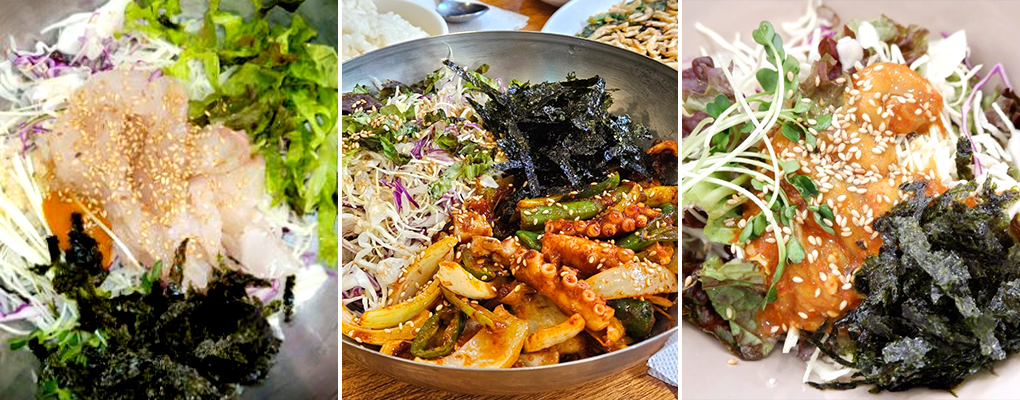
Mokpo Myeongga’s Signature Lunch Dishes: Raw Fish Bibimbap, Octopus Bibimbap, Sea Squirt Bibimbap
While it’s true that running a small business can be challenging, we’re not the only ones struggling. Big corporations also face challenges during economic downturns. I believe in mutual prosperity. If Amorepacific thrives, there will be more celebratory dinners and outings, which will also benefit us. I want to express my hope for everyone's success and let them know that we are cheering them on from afar.
What do you envision for the next ten years?
I hope things remain as they are now. Ideally, I’d love to continue working here for the next ten or even twenty years. As long as I’m capable, I want to keep working. Seeing regular customers always brings joy. With my accumulated experience and future learning, I believe I can only improve at what I do.
What does ‘happiness’ mean to you?
To me, happiness is the absence of trouble. My family’s happiness and my children growing up well are my sources of joy. I wish for Mokpo Myeongga to continue steadily without significant ups and downs. I don’t aim for overwhelming success; just hearing customers say they enjoyed their meal is enough. I hope things stay just as they are now, always.
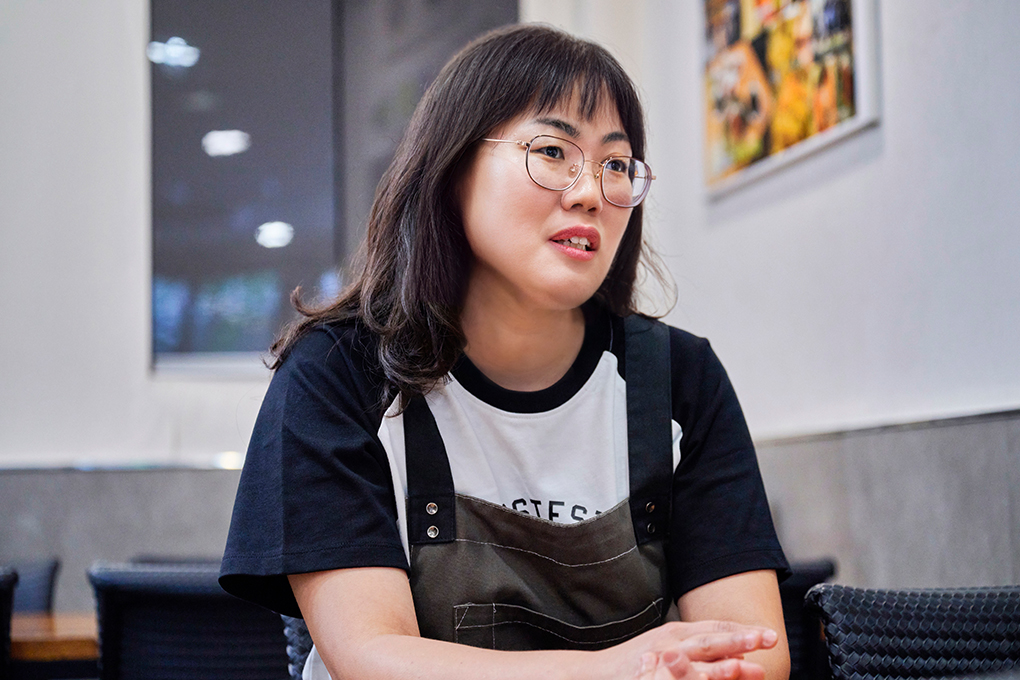
Interview with Kwak Seung-mi, Head of ‘Mokpo Myeongga,’ at the Yongsan Branch
epilogue
Despite societal perceptions of ‘career interruption,’ Kwak Seung-mi is building her career on her terms. Mokpo Myeongga's seasonal delicacies promise to bring a taste of summer soon.
‘100 Hangang-daero’ brings you interviews with business owners around Amorepacific, exploring the value and meaning of work through stories of passion, perseverance, and overcoming adversity.
Interview Shin Hye-won
Photos Design Mong
Planning Amorepacific Communications Team
-
Like
1 -
Recommend
0 -
Thumbs up
0 -
Supporting
0 -
Want follow-up article
0



